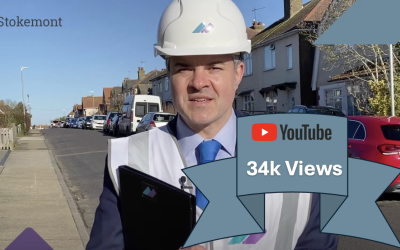In today’s property surveying blogpost topic, we are going to be taking a focussed look at basement conversions.
Basement conversions these days are some of the most typical types of party wall procedures that our team at Stokemont see themselves deal with.
In layman’s terms, a basement conversion occurs when the building owner, who is the owner undertaking the construction work. Undertakes works to their property which involve deep excavations or underpinning the party wall.
The majority of basement extensions will apply to semi-detached or terraced properties, as by the very virtue of the property type they share a party wall with the adjoining owner. The adjoining owner is the neighbour whose property borders, or adjoins, the proposed works.
Basement conversions are towards the upper end of the risk spectrum when it comes to party wall procedures mainly because the very nature and task of underpinning the party wall can come with significant risk.
This risk is not only in the design, but also in the manner in which the works are undertaken on site.
Effectively, this makes it a precarious form of work at best and in almost all cases there is likely to be some form of vibration or movement to the party wall.
Vibrations and movement to the party wall will result in minor issues such as hairline cracking, to your more major structural issues, for example cracks that are 2mm to 3mm plus or dropping or sagging of grounds or floors.
We are going to be taking a closer look at the type of procedures that are likely to come into play if indeed basement works are being undertaken to the building owner’s property.
First and foremost, it is worth bearing in mind that the party wall procedures are going to be a lot lengthier than normal, mainly because there are a significant number of moving pieces that are likely to require additional Party Wall Surveyor’s review, not to mention professional input from advising engineers.
To start with, a Party Wall Surveyor will want to ensure that the protections that the Party Wall etc. Act 1996 affords an adjoining owner have been fully considered and administered.
One of these protections that a Party Wall Surveyor can call upon is the input of an advising, or checking, engineer.
This effectively means that a second engineer will come onto the job alongside the building owner’s engineer. The engineer’s role will be to review the works from the perspective of the adjoining owner’s property ensuring that they pose the least amount of risk as possible.
It is worth noting that the checking engineer isn’t in place to redesign or critique the design, instead they are simply there to take an informed look and ensure that the overall works are mutually designed.
Once the checking engineer and building owner’s engineer have agreed the overall design they will then sign this off and usually pass it back to the Party Wall Surveyors to then agree the Party Wall Award.
Another procedure that we expect to see come into play with basement excavations is the request for security for expenses.
Security for expenses, which is formally dealt with under Section 12 of the Party Wall etc. Act 1996, is the vessel whereby an adjoining owner can request a sum of money to be held on account in advance of the party wall works commencing.
This sum of money is not only used in the event that there is an issue or damage on site, it can also be used by the adjoining owner to safeguard their property in the event that, for whatever reason, the building owner pauses, delays, or altogether abandons the work.
It is worth noting that in all the years we have been dealing with basement excavations here at Stokemont, we have never actually seen a scenario whereby the adjoining owner needed to dip into the security for expenses fund in order to safeguard their property.
It is therefore worth bearing in mind that the scenario is an incredibly rare one and adjoining owners should take some peace of mind and comfort in that fact.
Instead, the security for expenses often tends to be a vessel that gives the adjoining owner the all-necessary peace of mind that they are seeking and considering when looking at the high risk works that are taking place alongside them.
We have all seen the horror stories that often line the tabloids, with extensive cracking to properties, properties that have completely fallen down, or works that never get finished.
The security for expenses, in theory, will give the adjoining owners a necessary safeguard against this type of situation.
It is worth noting that basement works are not only high risk, but are high in complexity.
For this very reason a building owner should also best prepare themselves for increased costs when it comes to the overall professional fees, and that isn’t just the party wall fees.
They are likely to incur higher cost in the engineering and structural design, the Planning procedures, the contractor’s method statement, as well as all other fees that they are likely to incur during the course of the works.
Basement excavations and basement conversions are a fantastic way to increase and avoid having to pay the all-annoying stamp duty that comes with moving to a larger property.
If you would like to discuss your basement proposals with our team of qualified and experienced Party Wall Surveyors here at Stokemont, give us a call today and we would be more than happy to assist you.




